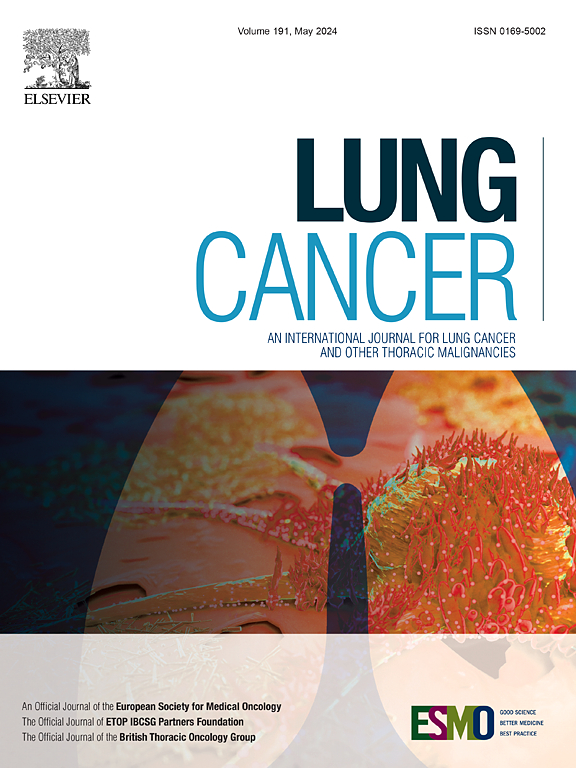HA-PCI对小细胞肺癌患者自我报告的认知功能和脑转移的影响:NCT01780675和PREMER试验的汇总结果
IF 4.4
2区 医学
Q1 ONCOLOGY
引用次数: 0
摘要
背景认知能力下降是需要颅脑照射的患者日益关注的问题。我们使用了两项III期试验(NCT01780675和PREMER)的纵向个体患者数据汇总,以研究海马回避(HA)-PCI与PCI相比是否与自我报告的认知功能(SRCF)改善相关,而在HA区域内不增加脑转移(BM)的发展。方法将I-IV期小细胞肺癌(SCLC)患者随机分为PCI组和HA-PCI组。评估SRCF,并在基线和长达24个月的随访期间进行对比增强脑磁共振成像(MRI)。比较两组间HA -PCI术后SRCF和BM发生率。自我报告的认知障碍定义为SCRF <;75.结果共纳入318例患者。纵向广义估计方程(GEE)分析显示,HA-PCI对SRCF (β = 1.41, p = 0.52)和认知功能障碍(OR 0.81, 95% CI 0.53-1.25, p = 0.34)均无显著影响。中位随访时间为41.7个月(95% CI 35.7-47.6),其中61例患者发生BM (PCI组:30例,HA-PCI组:31例,p = 0.9)。15例患者BM部位孤立(PCI组7例,HA-PCI组8例,p = 0.8)。61例患者中有9例在HA区有BM (PCI组:4例,HA-PCI组:5例,p = 1.0)。两组间脑脊膜炎发生率无显著差异(亚分布风险比[sHR] 1.03, 95% CI 0.62-1.70, p = 0.91)。结论ha - pci不能保留纵向SRCF,但也没有增加BM的风险。进一步提高PCI的治疗率,需要进一步研究其他策略。临床试验注册:ClinicalTrials.gov (NCT01780675)ClinicalTrials.gov (NCT02397733)。本文章由计算机程序翻译,如有差异,请以英文原文为准。
Impact of HA-PCI on self-reported cognitive functioning and brain metastases in small-cell lung cancer: Pooled findings of NCT01780675 and PREMER trials
Background
Cognitive decline is an arising concern in patients who need cranial irradiation. We used the pooled longitudinal individual patient data of two phase III trials: NCT01780675 and PREMER to investigate whether hippocampal avoidance (HA)-PCI is associated with improved self-reported cognitive functioning (SRCF) compared with PCI without increasing brain metastases (BM) development within the HA area.
Methods
Patients with stage I-IV small cell lung cancer (SCLC) were randomized to PCI or HA-PCI. SRCF was assessed and contrast enhanced brain magnetic resonance imaging (MRI) was performed at baseline and up to 24 months follow-up. SRCF and BM incidence after (HA)-PCI were compared between arms. Self reported cognitive impairment was defined as SCRF < 75.
Results
In total, 318 patients were randomized. Longitudinal generalized estimating equation (GEE) analysis showed that HA-PCI neither had a significant impact on SRCF (β = 1.41, p = 0.52) nor on cognitive impairment (OR 0.81, 95 %CI 0.53–1.25, p = 0.34). The median follow up was 41.7 (95 %CI 35.7–47.6) months, during which 61 patients developed BM (PCI arm: 30, HA-PCI arm: 31, p = 0.9). BM site was solitary in 15 patients (PCI arm: 7, HA-PCI arm: 8, p = 0.8). Nine of the 61 patients had BM within the HA area (PCI arm: 4, HA-PCI arm: 5, p = 1.0). The BM incidence was not significantly different between arms (subdistribution hazard ratio [sHR] 1.03, 95 %CI 0.62–1.70, p = 0.91).
Conclusion
HA-PCI did not preserve longitudinal SRCF but did also not increase the risk of BM. Additional strategies should be investigated to further improve the therapeutic ratio of PCI.
Trials registration:
ClinicalTrials.gov (NCT01780675)
ClinicalTrials.gov (NCT02397733).
求助全文
通过发布文献求助,成功后即可免费获取论文全文。
去求助
来源期刊

Lung Cancer
医学-呼吸系统
CiteScore
9.40
自引率
3.80%
发文量
407
审稿时长
25 days
期刊介绍:
Lung Cancer is an international publication covering the clinical, translational and basic science of malignancies of the lung and chest region.Original research articles, early reports, review articles, editorials and correspondence covering the prevention, epidemiology and etiology, basic biology, pathology, clinical assessment, surgery, chemotherapy, radiotherapy, combined treatment modalities, other treatment modalities and outcomes of lung cancer are welcome.
 求助内容:
求助内容: 应助结果提醒方式:
应助结果提醒方式:


